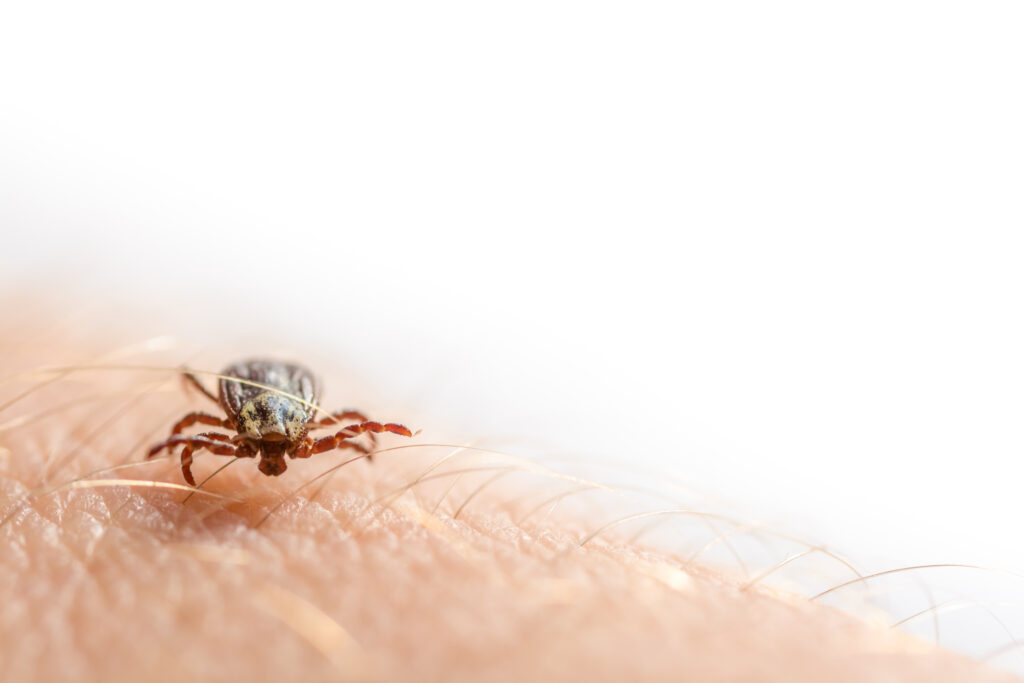As the weather heats up, daylight lasts longer, and people spend more time outdoors, tick bites become more common. Ticks are usually active during April to September, and the CDC notes that they often show up “in grassy, brushy, or wooded areas,” on animals, or even as close as your own backyard. In the event that one of your patients notices the tell-tale sign of a tick bite, it’s important that your triage nurses use the appropriate triage protocols to guide them to the right type of care. Consider the following case study of a mother and her son, and how a triage nurse from our call center helped them through this process.
The Initial Call
After finding what she believes is a tick bite on her 5-year-old son’s shoulder, a mother calls our triage line. She is greeted by an Answering Service Operator (ASO), who asks her detailed questions to determine the reason for her call and the urgency of the patient’s symptoms. The ASO lets the mother know the expected call-back time from a triage nurse, as well as the area code that the nurse will be calling from.
When the triage nurse reaches out to the mother, she has a solid foundation of the information she needs to develop the appropriate patient disposition.
Special Triage Considerations for Tick Bites
A skilled triage nurse already understands the added layer of difficulty of managing patient calls due to the simple fact that the nurse cannot physically see each patient. When it comes to tick bites, nurses must also be aware of some important factors:
- Tick bites often go unnoticed for days at a time, and any visible symptoms may be delayed for up to two (2) weeks.
- Patients may experience significant health complications from tick bites, depending on the type of tick and the associated disease they may carry.
The Call-Back
The responding triage nurse asks the mother to expand on the information she initially gave the ASO: what the mother observes about her son’s bite, as well as any treatment she may have already attempted. The mother states that she sees a round rash that surrounds a small black spot on her son’s shoulder, and that her child is acting normally. She says her son experiences some tenderness in the bite area. She adds that she doesn’t know when the bite occurred.
Qualifying Questions
Our nurses use the gold standard of triage protocols developed by Drs. Barton Schmitt and David Thompson to determine the severity of each patient’s symptoms and the type of care they should seek. Based on this instance, the responding nurse takes what the mother has relayed to her to develop qualifying questions for choosing the appropriate triage protocol:
When could your son have been bitten?
Did you remove the tick?
Can you see the head of the tick?
These questions allow the nurse to assess the urgency of care, and what the next steps will be for the patient.
The mother adds that her son is not experiencing a fever, that she and her son had been traveling to several parks over the course of the week, and that she hasn’t seen any indications of a tick during that time. Currently, she doesn’t see a tick around the bite area or anywhere else on her child.
The Protocol
The protocol selected by the triage nurse advises the caller to contact her son’s provider in the morning. She is also encouraged to call the triage line back if any new symptoms present themselves before that time, including a fever or an increase in discomfort or pain. The nurse recommends that the mother take a photo of the rash to share with the provider in order to compare any potential changes in the bite area. As the call is completed, the nurse saves all necessary information in the patient’s file — including all interactions during the call with the mother — and shares it securely with the provider’s existing EHR.
The Result
The mother follows our triage nurse’s advice, and takes her son in to see his provider the following day for evaluation.
Your Nurse Triage
Tick bites certainly aren’t the only common spring and summer concerns that callers will have. Does your nurse triage need updated Schmitt-Thompson protocols, or additional triage phone support during or after normal business hours? If so, we’re ready to help! Contact us today to learn more about our services.
About TriageLogic
TriageLogic is a URAC-accredited, physician-led provider of top-quality nurse telehealth technology, remote patient monitoring, and medical call center solutions. Founded in 2007, the TriageLogic Group now serves more than 9,000 physicians and covers over 25 million lives nationwide.





